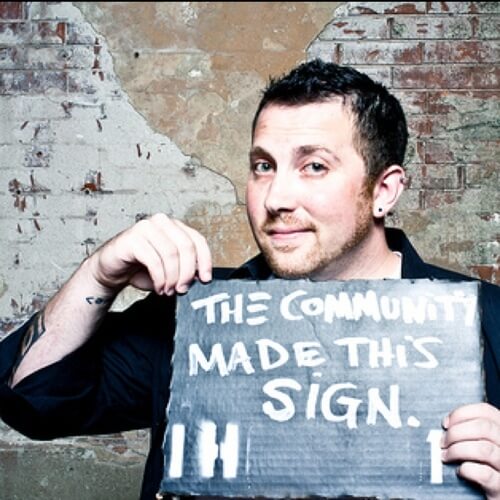One day, shortly after we moved into our “new and improved” Indy Hall office in 2009, a bunch of chess pieces showed up on one of our kitchen tables. Interestingly, there was no board – just a bunch of chess pieces, arranged as if there was a board.
A few days later, a board appeared below the pieces, along with a simple chess timer, and a sign that said “make a move”. A long game emerged. Anyone could walk up to the chess board, know which side’s turn it was, and make a single move. These games sometimes went on for days into weeks, and perhaps weirdest of all, was when you’d be playing against a move you made a few turns back.
Some regular players started recognizing each other at the board, and decided to change things up and start a game of speed chess. After a few days, speed chess became a spectator sport in the kitchen. People knew they could come by the kitchen around lunchtime and see a <10 minute game of chess played, and cheer on some of their coworkers competing.
Not content with the disparity in skill level, some players found a new chess timer app on the Android app store that started with 60 seconds on the clock, and it doubled your remaning time with each turn to build up a time bank. Essentially, you’d make a very fast series of irrational moves in order to accrue as much time as possible for the 2nd half of the game, where you’d need that time in order to “unfuck” the irrational game that’d been played for the sake of accruing time. The rationale behind this for leveling the playing field was: “no matter how skilled you are, nobody can reason with crazy”.
This warped version of speed chess turned into TEAM speed chess, where people played 3 on 3. Usual teams consisted of someone tactical, someone strategic, and a heckler. And let’s not forget – this is all done with an audience!
The final iteration was unexpected. A chess puzzle book arrived. Each chess puzzle is the last few moves of a game, designed by a chessmaster, and your goal is to figure out the series of moves to produce a checkmate.
A journey had been shared, from a largely impersonal long game, to the players combining forces to play against the game rather than one another.
While this is a remarkably true story, it’s also a great illustration of the phases that a coworker goes through during their journey through Indy Hall.
On your first day, you show up and there is very little structure. It’s uncertain what the rules are, but there are moves to be made if you’re brazen enough. You need to be patient, and you do need to look for opportunities to take your turn. Eventually, you will find the people you have genuine interests in. They may work on things similar or different than you, but excitement about finding others will build and the pace will pick up.
You may find that experiences vary, but at the same time, there’s no “smartest kid in the room”. Everybody has an opportunity to be that smartest kid for their speciality, a unique experience in the workplace. It’s that experience that allows trust to form, and allies/teams to organically form and disband as needed, as quickly as needed.
And, given the time for the process to complete, the ultimate working environment can be achieved – where the coworkers are no longer considering themselves competitors, but instead allies: the game changed, from being the battle ground, to the new opponent.
The players are given an opportunity to see that they’re best competing together, with the game as a mutual opponent, than against one another, to individual ends.
This understanding and expression is the key element that’s missing from most business environments, especially in America. Coworking isn’t just a new kind of place to work, it’s a better way to work, and a path to heal to the brokenness of business and our society.
 I am always thinking about the intersection of people, relationships, trust and business. I founded
I am always thinking about the intersection of people, relationships, trust and business. I founded